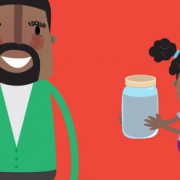Thermometer fun
Use a candy thermometer to teach your child how temperature rises. (Alternatively, you can use a mercury-based medical thermometer, but do not leave it unattended.) Show your child that the red liquid inside rises when the thermometer is placed in warm or hot water. Similarly, demonstrate how the mercury falls when the thermometer is placed in cool water.
Use the discussion questions to help your children talk about their emotions. As a parent, you can then remind your child about the thermometer when you see that they are having a difficult moment. You may even wish to think up a fun code phrase to remind them to go to God for help in “cooling off.” Here are some ideas:
Time to find some ice!
Who needs to go for a polar bear swim?
Shall we throw some cold water on this situation?
Let’s ask God to help us stay cool.
Questions for discussion
- What happens when I put the thermometer in hot water? How about cold water?
- How are our emotions like the water?
- What situations make you feel “heated up”?
- Have you ever heard the expressions, “cool as a cucumber” or “hotheaded”? What do you think they mean?
- How can you stay “cool” when something makes you feel heated up?
Key concepts
Our emotions are like the water. Satan likes to put us in situations where our emotions get heated. He then uses these “heated” times to tempt us to sin. The good news is that God’s Holy Spirit is like the cool water; He will help us keep our emotions under control.
Some examples of heated situations might include another child taking your favourite toy away from you without asking, a sibling who calls you a name, or when you see something in a store that you want, but you cannot have it. At these times, we need to go to God and ask Him to help us keep our emotions “cool” so that we do not give in to the temptation to sin.
Relevant Scripture
Ephesians 4:26 “ ‘In your anger do not sin’: Do not let the sun go down while you are still angry…”
Proverbs 25:28 “Like a city whose walls are broken down is a man who lacks self-control.”
1 Corinthians 10:13 “No temptation has seized you except what is common to man. And God is faithful; He will not let you be tempted beyond what you can bear. But when you are tempted, He will also provide a way out so that you can stand up under it.”
James 1:12-14 “Blessed is the man who perseveres under trial because, when he has stood the test, he will receive the crown of life that God has promised to those who love Him. When tempted, no one should say, ‘God is tempting me.’ For God cannot be tempted by evil, nor does He tempt anyone; but each one is tempted when, by his own evil desire, he is dragged away and enticed.”
James 1:19-20 “My dear brothers, take note of this: Everyone should be quick to listen, slow to speak and slow to become angry, for man’s anger does not bring about the righteous life that God desires.”








